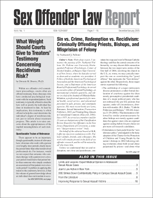“Vulnerable Victim” Sentencing Enhancement
Author: Roslyn Myers, Ph.D., J.D..
Source: Volume 21, Number 06, October/November 2020 , pp.90-95(6)

next article > |return to table of contents
Abstract:
This article analyzes the use sentencing enhancements—increasing the level of punishment for a convicted offender—when the victim is judged to be “vulnerable.” Typically, a vulnerable victim as a person who is a “victim of the offense of conviction” and who is unusually vulnerable due to age, physical or mental condition, or particularly susceptible to the criminal conduct for other reasons. Being "susceptible to the criminal conduct" indicates a victim’s impaired capacity to detect or prevent the crime. Under the U.S.S.G., Part A—Victim-Related Adjustments, the base offense sentencing level may be increased by two levels if “the defendant knew or should have known that a victim of the offense was a vulnerable victim.” (U.S.S.G. § 3A1.1(b)(1).) For the enhancement to apply, the victim must be “unusually vulnerable due to age, physical or mental condition,” or other characteristics rendering the person “particularly susceptible to the criminal conduct.” The author comprehensively examines and compares federal and state statutory provisions defining vulnerability, and analyzes what the courts have ruled when asked to consider the application of vulnerable victim enhancements.Keywords: U.S. v. McGaugh; United States Sentencing Guidelines (U.S.S.G.)
Affiliations:
1: Editor in Chief.